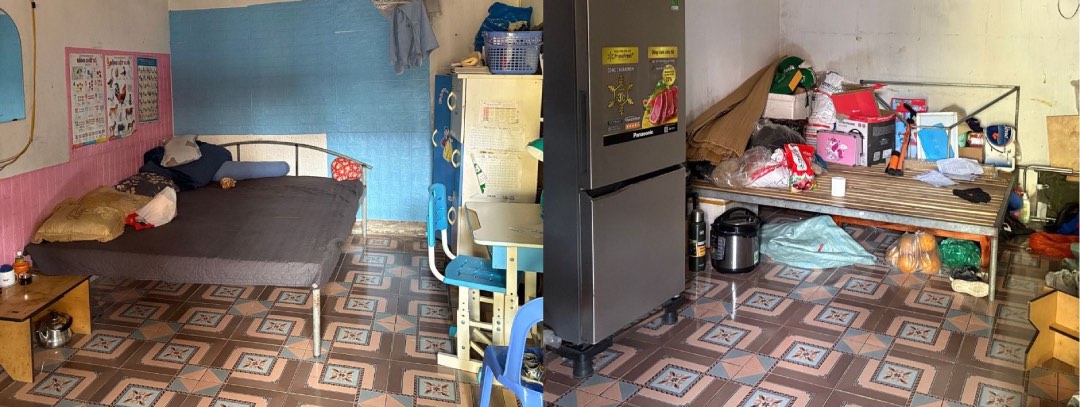Mr. Hung's boarding house in Nhue village (Kim Chung commune, Dong Anh district, Hanoi) has a fairly spacious campus. The boarding house is located entirely on the land of his house, which is also where he lives, so it is very secure.
Therefore, although it is located in a rather remote, hard-to-find place, and is quite old due to being built a long time ago, many workers still come to rent rooms. The rooms are all "filled" with workers, not left empty.
Mr. Hung said that in his boarding house, there are 3 families of workers renting 2 rooms at the same time. "These are all families of workers with 1-2 children living together. If a family of 3-4 people has to stay in one room, in addition to storing belongings and cooking, it will be very inconvenient for daily life. Therefore, families of workers often accept to pay more money to rent an additional room," Mr. Hung shared.
According to observations, the rooms in this boarding house have been built for quite a long time. Each room is very small, only about 10-15 m2, and there is no private bathroom. The members of the boarding house have to shower and use the toilet in a common area for the whole area.
Ms. Dinh Bao Yen, her husband and two sons rent two rooms at the same time in this area. According to Ms. Yen, if you live alone or just a couple, one room can be comfortable, but if you have two children, the space of 10-15 square meters will be very cramped.
Since having their second child, they discussed renting another room. She used one room for family members to eat, sleep, and rest; and the other room was used to store furniture, utensils, and cook.
"I still leave my washing machine in the yard. This boarding house has good security so I don't worry about losing this item," said the female worker from Phu Tho.
At the time she wanted to rent more, the room next door was already occupied, so she had to rent another room at the end of the row. Each room here costs 500,000 VND. So, she has to pay 1 million VND in rent every month.
Ms. Yen works as a factory worker, with a total income of about 10 million VND/month. Her husband works as a cook, with a higher income. The cost of raising the children is quite expensive. According to her calculations, each month, the cost of raising the children alone is about 6-7 million VND.
Yen’s neighbor, Tam, also spends an additional 500,000 VND per month to rent an additional room. The main room only has a bed, wardrobe, and a desk for her child. The secondary room is where she cooks and stores her belongings.
Ms. Tam said that before having children, she and her husband had saved 200 million VND to buy a piece of land in the countryside. Therefore, she did not plan to work as a long-term worker in Hanoi, but would return to her hometown, build a house on the land she already had, and find another job to stabilize her life.

"I don't want to live in an apartment, but even if I wanted to, I don't have enough money to buy one," Ms. Tam shared. Buying land in Hanoi is something she really wants, but for her and her husband, it is still just a dream. In addition, renting an apartment is not feasible because the rental price is quite high, and there are not many suitable options in this area.
According to the female worker, her grandparents in the countryside are both busy with work so they cannot look after their two children. Moreover, she also wants her children to live with her so that they can take better care of and educate them. Renting two rooms helps her family have more space to live, without the smell of food if the cooking area is in the room; thanks to that, the children can sleep better...
According to a survey on the living conditions, employment, and wages of workers in 2023 conducted by the Legal Policy Department in coordination with the Institute of Workers and Trade Unions (Vietnam General Confederation of Labor) in April 2023, workers have to use 23.6% of their salary and 17.9% of their monthly income to pay rent for houses with an average area of 21.1 square meters.
Workers have to spend an average of 1,808 million VND/month (including electricity and water bills). This amount accounts for 23.6% of the worker's salary and 17.9% of the worker's monthly income.











